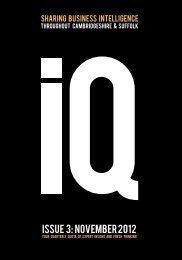IQ-Magazine-Issue-15
Create successful ePaper yourself
Turn your PDF publications into a flip-book with our unique Google optimized e-Paper software.
<strong>IQ</strong> legal<br />
Warnings<br />
on social media<br />
In the recent case of British Waterways Board v.<br />
Smith, The Employment Tribunal (EAT) concluded<br />
that it was fair to dismiss an employee who had<br />
made derogatory comments about his employer on<br />
Facebook. This case was noteworthy because the<br />
employee’s misconduct had taken place two years<br />
before his dismissal and the employer had been aware<br />
of it as far back as one year beforehand.<br />
The EAT found that the delay in the employer relying<br />
on the misconduct as a basis for dismissal (for gross<br />
misconduct) had no effect on whether or not the<br />
employee had been fairly dismissed, nor did the EAT<br />
consider it appropriate to criticise the employer for the<br />
delay in taking action. The EAT disagreed with the<br />
decision of the lower employment tribunal, which held<br />
that the dismissal fell outside the range of reasonable<br />
responses which a reasonable employer might have<br />
adopted in these circumstances.<br />
The case is a warning to employees who have made or<br />
who may be tempted to make derogatory comments<br />
about their employer on social media, and any delay<br />
in its discovery or response thereto will not necessarily<br />
mean that the employer will have lost the opportunity<br />
to take action at a later date. The case is also an<br />
important reminder for employers to maintain and<br />
police an effective Social Media Policy.<br />
Mark Edmondson, director<br />
at Edmondson Hall Solicitors,<br />
highlights the growing need<br />
for employers to consider<br />
a Social Media Policy<br />
ACAS advises employers to consider<br />
the following points:<br />
• Work out a policy: An employer should set<br />
out in writing what it regards as acceptable<br />
behaviour in the use of social media at work,<br />
and also what is unacceptable. It should<br />
also give clear guidelines for employees<br />
on what they can and cannot say about the<br />
organisation.<br />
• Draw a line between private and work lives:<br />
An employer should be clear throughout<br />
its policy in making a distinction between<br />
business and private use of social media. If it<br />
allows limited private use in the workplace,<br />
or use which is in any way connected with<br />
the organisation, it should be clear what this<br />
actually means in practice.<br />
• Be ready to adapt: A policy can have many<br />
benefits, but an employer should make sure<br />
it is written in a way that can accommodate<br />
alterations, so it keeps pace with the<br />
continuing evolution of social media.<br />
More Information<br />
www.edmondsonhall.com<br />
www.acas.org.uk<br />
issue <strong>15</strong> | page 23


















